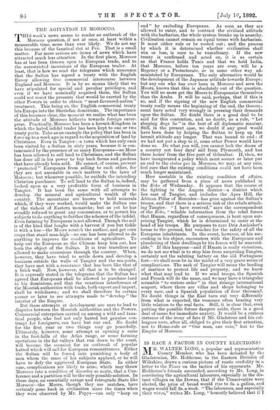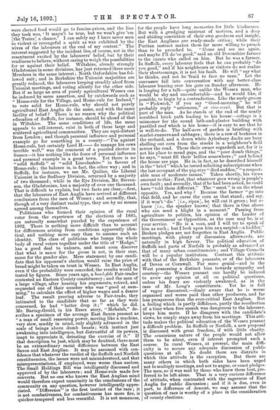IS RACE A FACTOR IN COUNTY ELECTIONS?
IVTR. WALTER LONG, a popular and representative _L County Member, who has been defeated by the Gladstonian, Mr. Hobhouse, in the Eastern Division of Wiltshire, draws a curious picture of rustic credulity in a letter to the Times on the tactics of his opponents. Mr. Hobhouse's friends succeeded, according to Mr. Long, in convincing the agricultural labourers, especially in the dis- tant villages on the Downs, that if the Conservative were elected, the price of bread would rise to 3s. a gallon, and wages would fall 2s. a week. " The labourers, and especially their wives," writes Mr. Long, " honestly believed that if I were elected food would go to famine-prices, and the line they took was, ' It mayn't be true, but we won't give 'em [the Tories] a chance.' I can safely say I have never seen so violent or revengeful a spirit as was exhibited by the wives of the labourers at the end of my contest." The interest suggested by the incident lies, of course, not in the resentment excited by the labourers' belief, but by their readiness to believe, without caring to weigh the possibilities for or against their belief. Wiltshire, already strongly Gladstonian in some divisions, has just returned three more Members in the same interest ; North Oxfordshire has fol- lowed suit ; and in Berkshire the Unionist majorities are greatly reduced, the labourers keeping steadily aloof from Unionist meetings, and voting silently for the other side. But if so large an area of purely agricultural Wessex can be induced by mere assertion, and by catchwords such as " Home-rule for the Village, and Home-rule for Ireland," to vote solid for Home-rule, why should not purely agricultural East Anglia do the same, and with the same facility of belief ? There is no reason why the political education of Suffolk, for instance, should be ahead of that in Wiltshire. The same conditions of life, the same appeals to self-interest, exist in both of these large and scattered agricultural communities. They are equi-distant from London ; and though personal influence and personal example go for something in a county—" I'm against Home-rule, but certainly Lord H— do manage his cows terrible well," was the comment of a puzzled elector in Sussex—it has nothing like the force of personal influence and personal example in a great town. Yet there is no " solid Suffolk " or " solid Lincolnshire " in favour of Home-rule; the balance is, in fact, the other way ; and in Suffolk, for instance, we see Mr. Quilter, the Liberal Unionist in the Sudbury Division, returned by a majority of two thousand ; while in the Eye Division, Mr. Steven- son, the Gladstonian, has a majority of over one thousand. That is difficult to explain, but two facts are clear,—first, that the labourers of East Anglia have arrived at different conclusions from the men of Wessex ; and secondly, that, though of a very distinct racial type, they are by no means agreed among themselves. Politicians who formed their opinion of the rural voter from the experience of the elections of 1885, are naturally somewhat puzzled by the experience of 1892. There is nothing more difficult than to account for differences arising from conditions apparently iden- tical, and nothing more easy than to assume such an identity. The class of politician who lumps the whole body of rural voters together under the title of " Hodge," has a good deal to unlearn, and must soon discover that what is sauce for the goose is not, in their case, sauce for the gander also. Mere statement by one candi- date that his opponent's election would raise the price of bread might be taken on trust in Wessex. In East Anglia, even if the probability were conceded, the results would be tested by figures. Some years ago, a bond-fide Fair-trader contested an Eastern County constituency ; and the men of a large village, after hearing his arguments, retired, and requested one of their number who was " good at sum- ming," to calculate the effect of higher wages and a dearer loaf. The result proving adverse to Fair-trade, they intimated to the candidate that so far as they were concerned, he had " better drop it ; " which he did. Mr. Baring-Gould, in his Essex story, " Mehalah," de- scribes a specimen of the average East Saxon peasant as "a man of small reasoning power, moving like a machine, very slow, muddy in mind, only slightly advanced in the scale of beings above dumb beasts ; with instinct just awakening into intelligence, but distrustful of its powers, inapt to appreciate it, detesting the exercise of it." If that description be just, which may be doubted, there must be an extraordinary racial difference between the East Saxon and East Anglian. It may be assumed with con- fidence that whatever the verdict of the Suffolk and Norfolk constituencies, the issues were not misunderstood, and that misrepresentations, if employed, were worse than useless The Small Holdings Bill was intelligently discussed and approved of by the labourers ; and Home-rule made few converts. But no one who knows the East Anglian mind would therefore expect unanimity in the conclusions of the community on any question, however intelligently appre- ciated. " Difference" is the first instinct of the race ; it is not combativeness, for combativeness has more fire, is quicker-tempered. and less resentful. It is not meanness, for the people have long memories for little kindnesses. But with a grudging mistrust of motives, and a deep and abiding conviction of their own goodness and insight, the East Anglians are ready-made critics ; while their Puritan instinct makes them far more willing to preach than to be preached to. " Come and see me again, and maybe I'll do 'ee good," said an old Devonshire farmer to the curate who called on him. But he was a farmer. In Suffolk, every labourer feels that he can probably " do you good," and if his neighbours or visitors do not realise their shortcomings, it is not his fault. He will " say what he thinks, and not be 'fraid to face no man." Let the canvasser fall into conversation with any better. class labourer leaning over his gate on Sunday afternoon. He is longing for a talk—quite unlike the Wessex man, who would be shy and uncomfortable—and he would like, if possible, to begin by a contradiction. Like the surly groom in " Pickwick," if you say " Good-morning," he will probably reply " arternoon,' or vice-versa. But that is part of the man. As he stands at the end of the neatly scrubbed brick path leading to his house—cottage is a misnomer for the sound lath-and-plaster building with pantiled roof which is his home—it is easy to see that he is well-to-do. The half-acre of garden is bristling with scarlet-runners and cabbages ; there is a row of beehives in the orchard, and a dozen white Aylesbury ducks are busy shelling out corn from the stooks in a neighbour's field across the road. These their owner regardeth not, for it is not his place to mend gaps, and the " poor dumb things," he says, "must fill their bellies somewhere ;" and behind the house are pigs. He is, in fact, as he described himself in the " brief " which he issued soliciting subscriptions when the last occupant of the pig-stye " died sudden," " a respect- able man of moderate means." Taken shortly, his views amount to this : First, that whatever goes wrong is people's own fault ; and secondly, that if he had been asked, he could have " told them different." The " smut " is on the wheat opposite. Yes, and why ? Because the farmer " go into that field, and he curse the corn as that stand ; and say, if it won't die' [i.e., ripen], he will cut it green ; but we know [i.e., the speaker knows] that there is One above who can send a blight in a moment." Passing from agriculture to politics, his opinion of the Leader of the Government or Opposition, as the case may be, is at your service. " He is a man, and I will try to speak of him as such ; but I look upon him as a sarpint—a hadder." Broken pledges are not forgotten in East Anglia. Public meetings, with plenty of discussion afterwards, are naturally in high favour. The political education of Suffolk and parts of Norfolk is probably as advanced as that of many urban constituencies; Village Councils will be a popular institution. ontrast this attitude with that of the Berkshire peasants, or of the labourers ,of Devon or Cornwall. Far more genial—and in the West possessing a distinct bias towards sympathy and courtesy—the Wessex peasant can hardly be induced to avow any opinion at all on political questions, unless his fears are violently awakened, as in the case of Mr. Long's constituents. Yet he is full of vague discontent,—dimly aware that he is worse organised and worse paid than other producers, and far less prosperous than the ever-critical East Anglian. But a feeling which is partly diffidence, partly the recollection of a time when free speech was dangerous to the labourer, keeps him mute. If he disagrees with the candidate's views, he simply stays away from his meetings. This atti- tude makes the political education of the Wessex peasant a difficult problem. In Suffolk or Norfolk, a new proposal is discussed with great freedom, if with little charity. The censorious nature of the people would not allow them to be silent, even if interest prompted such a course. In rural Wessex, at present, the main diffi- culty is to secure any adequate discussion of public questions at all. No doubt there are districts in which this attitude is the exception. But there are many others in which both sides have been urged not to multiply meetings, and not to argue, or exact pledges. The men, so it was said by those who knew them best, pre- ferred to be left alone. That is a very curious difference of attitude, when contrasted with the eagerness of East Anglia for public discussion ; and if it is due, even in part, to difference of descent, we may assume that the question of race is worthy of a place in the consideration of county elections.



































 Previous page
Previous page